Home Read online
Home © 2003 Robert Muchamore.
The right of Robert Muchamore to be identified as the author of the work has been asserted by him in
accordance with the Copyright Designs and Patents Act 1988
This online version of Home has been made available for download on the website www.muchamore.com it is
not to be reposted on other web sites or reproduced for any purpose execpt for non commercial publishing use.
Authors Note:
This is a draft of a complete novel. It has not been copy edited and so contains many small errors and mistakes.
I hope you enjoy it anyway!
1. MAPS
On a map, central Africa seems the same as anywhere else. Countries, rivers, cities, railway lines and roads. But these countries barely even exist. Governments are powerless. Roads are grown over. The cities are sewers and the railway tracks all got stolen and melted for scrap.
Only two things really matter: guns and food. There are plenty of guns and not much food. If you don’t have both, you won’t live long.
2. CORRUPTION
The heat whacks you in the tunnel between the plane and the terminal. Fifty miles off the equator, your lungs need a few breaths to get used to it. My little brother, Adam, had himself in a state thinking he’d left his Gameboy on the plane. Half his stuff fell out of his pack when he unzipped it to check. All the other passengers had to step over him while he scooted around picking everything off the floor. Dad was way ahead. You always got the sense he’d be miles in front before he missed you. ‘It’s in there,’ Adam said, standing back up. He’d checked a thousand times already. He was more worried about losing the Gameboy than about all the injections before we left. Truth told, I was the one scared of injections, even though I was fifteen and Adam was only eight.
The airport was in a right state. It smelled like rotting food and piss. The carpet was all threads and crumbling black rubber. There were a few broken chairs and the TVs that showed flight information were either busted or stolen. All the shops were boarded up, but a woman in a headscarf sold fizzy drinks off a stall built from plastic crates. We caught Dad up. He was smiling, shaking the hand of an airport guide. ‘Mr Leconte, we meet again,’ Dad said. ‘These are my sons: Jake and Adam.’ ‘Ah Haaaa,’ Mr Leconte beamed. ‘Two handsome fellows.’ Mr Leconte shook our hands. His gut hung over his belt and his peach coloured shirt was covered with dark sweat patches. I’d learned the language from my parents, but the city dialect was a bit different. Mr Leconte rattled off words faster than my brain could grab them. ‘You’re almost as big as your Father,’ Mr Leconte said, looking at me. It was only true if almost as tall meant thirty centimetres shorter. My Dad was massive. When I was little Dad told me he could have been a heavyweight boxing champion if he’d wanted to. I believed him until Mum heard about it; she practically fell off her chair laughing at the thought.
‘Boys, luck is on our side today,’ Dad said. ‘Mr Leconte is the man I always hope to meet when I get off the plane.’
Dad had warned us that getting out of the airport with your luggage and dignity intact was tricky. There were soldiers, police, customs and military police, plus the people working for the airline and the baggage handlers. Most of them were trying to steal your stuff or get a bribe. If you got the bribes wrong you ended up paying a fortune, or you didn’t pay enough and got put in a five hour queue waiting to be strip searched. An airport guide knows who to pay and how much to pay them. With a bit of luck, you’re through customs and out the door in a few minutes.
Nobody bothered to hide the fact they were taking bribes. Mr Leconte’s first trick was five dollars in the palm of an airline employee. This got us access to a small staircase, which led onto the tarmac where the bags were being taken off our plane. The jet engines turned gently, wafting the sickly smell of aviation fuel through the boiling air.
Once our bags emerged, Me, Dad and Mr Leconte grabbed two each. Mr Leconte gave a few bank notes to the baggage handlers. We crossed the tarmac, passing under the tails of three more jets, before going onto another staircase. By the time we made it up, my arms felt like they were coming out of their sockets.
Two government soldiers stood at the top of the stairs. Soldiers were everywhere in the city, wearing identical green uniforms, with cheap rubber boots and sunglasses. These two had M16 assault rifles slung across their chests. One soldier put our bags on a trolley. The other one palmed fifty dollars from Mr Leconte.
This part of the airport was deserted. It was built specially for the President and VIPs. There was air conditioning, fancy halogen lamps and TV’s showing a dubbed episode of Friends. Adam jumped on top of the luggage cart. Dad wheeled him towards the customs gate.
Mr Leconte waved money at a man standing in front of an x-ray machine. Judging by the braids and stripes on his uniform, he was someone important. I couldn’t hear what they were saying, but it started getting heated. ‘What’s the problem?’ Dad asked. ‘I always pay him a hundred dollars,’ Leconte said. ‘Today he wants a hundred, for each of you.’ ‘You can have one twenty-five,’ Dad said angrily. ‘And that’s daylight robbery.’ The customs man looked at Dad as if he was something he’d scraped off his shoe. ‘There’s a four hour queue to get out of the main exit,’ the customs man said, casually. ‘Pay me three
hundred, or go back and stand in line.’ ‘I know the Minister of the Interior,’ Dad said. ‘I could make life very difficult for you.’ The customs man gave Dad a giant smile, ‘I also know the Interior Minister very well. I am even better
acquainted with my Brother in Law, the President of this country.’ Dad couldn’t trump that. He looked furious. ‘What about two hundred gentleman?’ Mr Leconte suggested, trying to smooth things over. The customs man eyeballed Dad: ‘No. This man dared threaten me. Now he must pay four-hundred dollars, or we will begin carefully
inspecting his luggage.’ ‘Two fifty,’ Dad said. The customs man clicked his fingers. A soldier sitting behind the x-ray machine stood up and pointed
his gun at Dad. Adam looked frightened and started sniffling. ‘OK, OK.’ Dad said. Four-hundred dollars,’ Dad reached in his pocket and handed over the cash. I told Adam to stop balling and pushed the trolley through the gate. ‘I think the customs man is drunk,’ Mr Leconte said. ‘Normally he’s very reliable. You’re a good client
Mr Pascal. Forget my fee this time and I’m sorry for the unpleasantness.’ ‘Not your fault,’ Dad grinned. Dad patted Mr Leconte’s shoulder and tucked a roll of banknotes into his shirt pocket. Then he looked
at his Rolex. ‘Twenty-one minutes to get out of the airport,’ Dad smiled. ‘Not a bad way to spend six-hundred
dollars.’ Six-hundred dollars local currency was about forty pounds. We piled our luggage into a battered Toyota taxi for the short drive to the cargo terminal. Dad let me
sit up front next to the driver. He put his arm around Adam in the back. ‘What are you upset for, little soldier?’ Dad asked. ‘I thought that man was gonna shoot you.’ Adam sniffled. ‘Bullets bounce off me,’ Dad said. ‘I’m made of steel.’ Dad thumped his chest. Adam broke out in a little smile. ‘We should have gone to Disneyworld again,’ Adam said. ‘They never try and shoot you there.’ Dad’s huge laugh boomed around the inside of the cab. ‘Bloody Disneyworld. Never again,’ Dad laughed. ‘Forty bloody minutes in a queue for a ride that lasts
thirty seconds. That place made me absolutely insane.’ Dad squeezed Adam and kissed his cheek. ‘Don’t you want to see your Grandma? And play with all your cousins?’ Adam smiled for Dad, but neither of us wanted to be here. Mum said she’d never go to Africa again. The last time she came, her wedding ring got stolen from the hotel room and some guy attacked her in the street. I don’t remember the trip, I was only a baby. Adam wasn’t
even born.
. . .
Dad was in the import-export business. His company bought up empty space on container ships and sent junk to Africa. Poor man’s gold, Dad called it: worn tyres, used shoes, clothes, old fridges and microwaves, date expired tins of food.
You might throw away your hair drier, food mixer or whatever. It’s too much bother to get them repaired. But in Africa, there are men who strip all this stuff down and make it work again. Fill a container up with the right kind of junk, send it to Africa and you can make serious money.
Dad got rich off junk. He got a different Mercedes every year. Mum drove a big Range Rover. Me and Adam went to public school and we were always going abroad on holiday.
The business worked out of a semi-derelict warehouse at the back of Kings Cross station, in London. When I was little, I used to love running around inside. The roof leaked and I had to wear wellies because the floor was all muddy. People turned up all day long; from dustmen with collections of small electricals they’d found on their route, to huge lorries filled with cans of food.
The woman who drove the forklift used to let me sit on her lap as she picked the pallets out of the trucks. At one time my biggest ambition was to be allowed to touch all the levers and drive the forklift myself.
Course, by the time I was old enough to drive it, playing in a cold, muddy warehouse wasn’t my idea of fun anymore. At fifteen I had this big fantasy about how my life would go. I’d pass all my A-levels, study business and economics at university, then get a job at a merchant bank that paid big bucks. I’d wear handmade £1,500 suits, have my own executive box at the Arsenal and be married to a stunning babe who was resident DJ in a nightclub. I’d give Adam my share of the junk business when Dad retired; I wouldn’t need the money.
. . .
The tails of the cargo planes poked over the opposite side of the terminal building. The taxi driver piled our luggage on the pavement. It was a single storey building a couple of hundred meters long, but one end had burned out in a fire. A few families lived amongst the wreckage, in homes built from charred scraps. Two raggedy kids sat against the terminal wall, begging. ‘Why can’t they live in houses?’ Adam asked. ‘Probably farmers,’ Dad explained. ‘There’s a war between the government and rebels from the east. Soldiers destroy farms and steal all the food. The farmers that don’t get killed run away to the city, but there’s no work here and nowhere for them to live.’ Dad went in his trousers, peeled a five dollar note off his roll of cash and handed it to Adam. ‘See if that cheers them up.’ The beggars were about Adam’s age, but he probably weighed more than the pair of them. Adam was
scared to go near them for some reason, he tugged my hand. ‘Come with us, Jake.’ The beggars looked worried as we approached. Loads of people must have given them a hard time. Adam reached out with the note and the bony little faces lit up like it was Christmas, Easter and pancake Tuesday rolled into one. One kid swept the note from Adam’s fingers and ran away. The other one scratched around on the concrete, picking up about fifteen cents in coins that people had dropped around him. When the boys were about ten metres away, they stopped running and waved at us. ‘Thank you Sirs.’ Then they disappeared into one of the little shacks. ‘How much is five dollars in English money?’ Adam asked. ‘About forty pence,’ Dad said. ‘It’s enough to buy half a sack of rice. They’ll eat well for the next few
days.’ ‘Then what?’ Adam asked. Dad didn’t answer. People rushed up to Dad as soon as he stepped inside the cargo terminal. A couple of guys grabbed our luggage. Before I knew it, half a dozen sweaty men were shaking my hand and patting my shoulder. Adam got it even worse. One guy picked him up and started carrying him around to some office women who gave him kisses. The look on Adam’s face was priceless. In England, Dad was a wealthy businessman and people respected him, but here it was like he was a pop star.
Once things settled down we got taken through to Dad’s office. Two guys sat at one end with their heavy boots on a glass topped coffee table. They both held glasses of scotch. Dad introduced us.
‘My bodyguards, Tim and Banky,’ Dad explained. ‘They’ll keep us safe while we’re staying at Grandma’s.’
The two guys crushed my hand as they shook it. They looked like absolute nutters. They both wore black fatigues, and had machine guns, hunting knives, pistols, ammo belts and grenades hanging off every place you could think of and probably a few you couldn’t. Adam was in love. He squeezed between Tim and Banky on the sofa and started pointing at all the weapons asking what they were called and what they did.
Dad got a satellite phone out of his desk. It was about 3 times the size of a normal mobile, and would work anywhere on the planet. You could get normal telephones in the city, but they were so unreliable you used a satellite phone if you were rich enough to have one. Dad threw me the handset. ‘Call your Mum. It’s five quid a minute, so cut down on the rabbit.’ The number was in the speed dial. Mum picked up after a couple of rings. ‘Hey Mum, it’s me, we’re here.’
‘AtGrandma’s?’ ‘No, were still in the city. The flight from Paris was delayed five hours.’
‘How’s Adam?’ ‘He slept most of the way. He’s hanging off my waist wanting to talk to you. I’ll put him on.’ ‘OK Jake. See you in three weeks. Keep safe.’ ‘No worries Mum. Love you... Here’s Adam.’
3. FLIGHT
Dad’s company had three small cargo aeroplanes. They were Douglas DC3s; mirror finished, with Air Amanda logos and beautiful women with giant afros airbrushed on the sides. Amanda was my Mum’s first name. The planes were over sixty years old, with a propeller engine under each wing. Dad could have afforded newer planes, but he was a complete DC3 nerd. He had loads of books on them at home, there was a mahogany model of one on the desk in our study and he even belonged to the DC3 owners club.
It was a buzz standing on the tarmac looking at Dad’s planes. I’d only seen pictures before. They were probably the cleanest, best maintained things I saw my whole time in Africa.
Our plane was packed with cargo, waiting to leave. The pilot was this old white guy with a beard. Dad sat next to him in the front with Adam on his lap. I got into a battered jump seat behind the pilot. All the ancient switches and dials were lit up, and there was this great smell of old leather and oil. Banky and Tim had to make the best of it amongst the pallets in the cargo bay.
Outside, someone pulled the blocks out from under the wheels. The pilot started the engines. After a few metres taxiing, he turned onto the runway and opened up the throttles. The runway was full of cracks. The plane juddered over every one. I put my hands over my ears to cut out the noise.
It got smoother once we were off the ground. We had to stay low, to avoid the jets coming in and out of the main terminal. The city beneath us was a desperate place. Millions of shacks built out of timber and plastic sheets, open sewers and mountains of rubbish everywhere. Within a few minutes, the city was gone and all that lay ahead were thousands of miles of jungle, broken occasionally by farming villages and giant square holes cut out by logging companies.
The little plane stayed well below the clouds. The scenery was amazing: huge birds circling over the canopy of trees, mountains with giant waterfalls spewing into rivers. It was so beautiful it did my head in. I was finally starting to like the idea of Africa; experiencing a different way of life and meeting Dad’s family. Most people would never get a chance to see stuff like this. I felt guilty that all I’d done was moan that we weren’t going to Spain or Florida. ‘I need to go,’ Adam said. There was no toilet on the plane. Dad had brought an empty plastic Coke bottle. Adam stood in the corner behind Dad and peed into it. He was shaking himself off when there was a grinding noise, like a car missing a gear. I looked out the side of the plane in time to see the right propeller shatter and a ball of flame blasting back under the wing. My guts shot into my mouth. About ten buzzers and alarms started going off. ‘Extinguishers,’ the pilot shouted. Dad pulled on a lever above his head. A sea of white fo
am squirted out around the engine, quenching
the flames almost instantly. ‘Shit,’ Dad laughed, holding his hand over his chest. ‘My old heart can do without too many of those.’ ‘Think we hit a bird or something,’ the pilot said. ‘Are you boys OK?’ We were a both shaken up. Adam got back on Dad’s lap and gave him a hug. ‘Can we fly on one engine?’ I asked. ‘We can even take off with one engine with a long enough runway,’ the pilot said. ‘Although we’re much slower. It’s safest if we put down at the nearest airstrip and get one of the other planes to fly up with a mechanic.’
‘How do we know if it’s safe when we land?’ Dad asked. ‘There’s a bloody war going on down there. If the rebels are controlling that area, they’ll steal the plane and probably kill us as well.’
‘You’ve got Banky and Tim, and It’s mostly government controlled until you get much further east,’ the pilot said. ‘I’ve heard stories about DC3’s flying thousands of miles on one engine,’ Dad said. The pilot weighed it all up: ‘I suppose the chances of rebels ambushing us at an airstrip are a lot greater than the chances of the other engine failing; besides your sons look tired. Lets finish the journey and sort out the aeroplane in the morning.’
With one engine the plane was quieter. It felt skittish, like it was fighting against the wind. The pilot calculated the journey would take an extra hour on one engine, two hours altogether.
The sunset over the jungle was about the most beautiful thing I’d ever seen. Deep oranges and purples flooding over the scenery, but the transition from bright sunlight to blackness only took a few minutes. We’d been travelling for twenty hours, I closed my eyes and drifted off to sleep.
I was woken up by Dad shouting. There was no engine noise, just air rushing against the outside of the plane. ‘I’m trying to restart it,’ the pilot said. Dad hammered a gauge with his knuckle, hoping it wasn’t telling the truth. ‘There’s no pressure in the fuel system,’ Dad said. The pilot was franticly rocking switches and pulling levers. Banky’s head came in through the cockpit

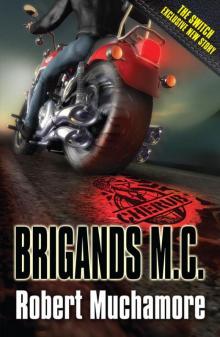 Brigands M.C.
Brigands M.C. Home
Home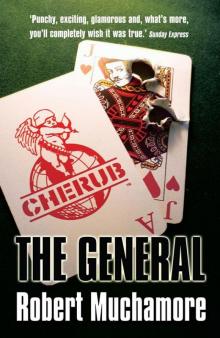 The General
The General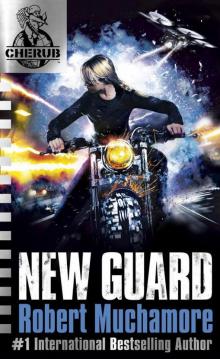 New Guard
New Guard Lone Wolf
Lone Wolf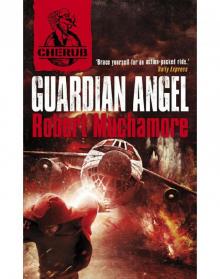 Cherub: Guardian Angel: Book 14
Cherub: Guardian Angel: Book 14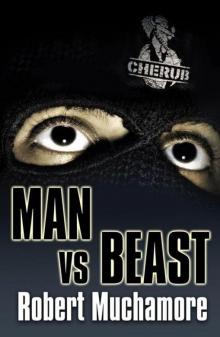 Man vs. Beast
Man vs. Beast The Escape
The Escape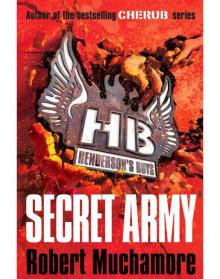 Secret Army
Secret Army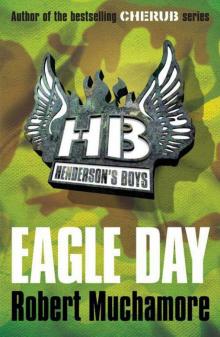 Henderson's Boys: Eagle Day: Book 2
Henderson's Boys: Eagle Day: Book 2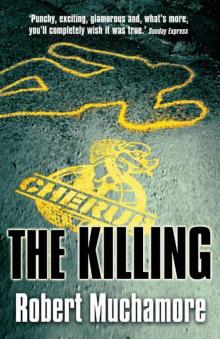 The Killing
The Killing Divine Madness
Divine Madness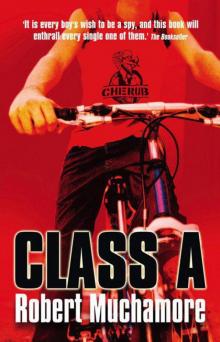 Class A
Class A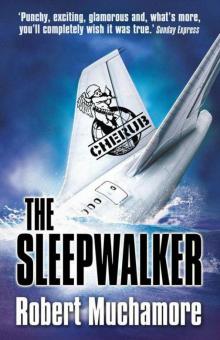 The Sleepwalker
The Sleepwalker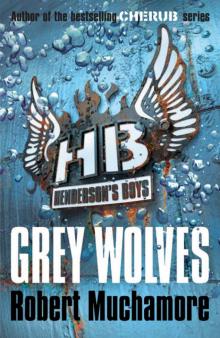 Henderson's Boys: Grey Wolves
Henderson's Boys: Grey Wolves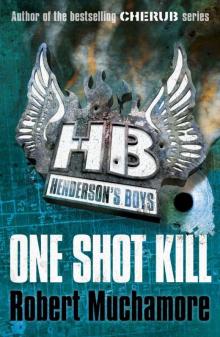 Henderson's Boys: One Shot Kill: One Shot Kill
Henderson's Boys: One Shot Kill: One Shot Kill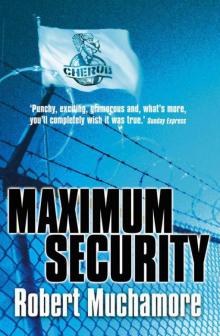 Maximum Security
Maximum Security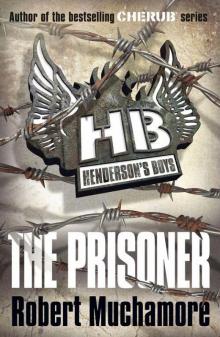 The Prisoner
The Prisoner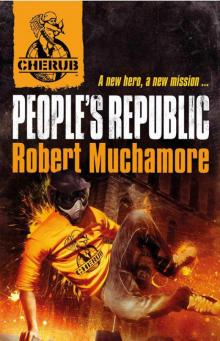 People's Republic
People's Republic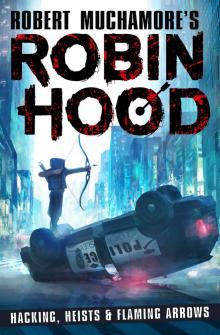 Robin Hood: Hacking, Heists and Flaming Arrows
Robin Hood: Hacking, Heists and Flaming Arrows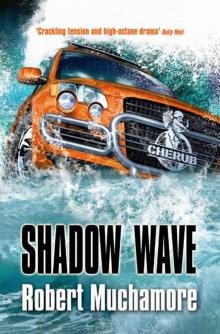 Shadow Wave
Shadow Wave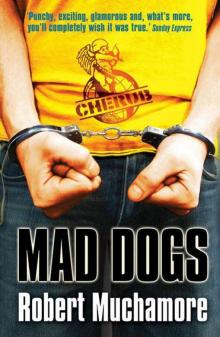 Mad Dogs
Mad Dogs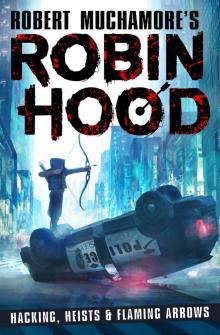 Robin Hood
Robin Hood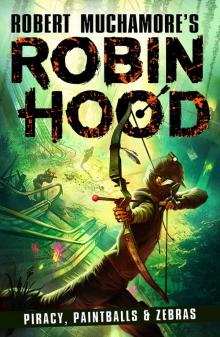 Robin Hood 2
Robin Hood 2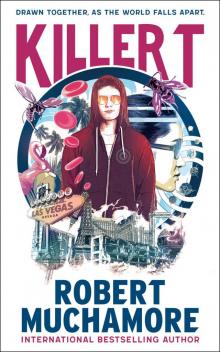 KILLER T
KILLER T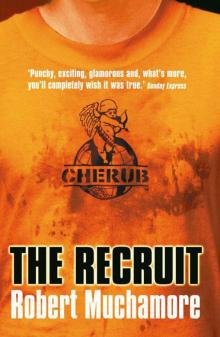 The Recruit
The Recruit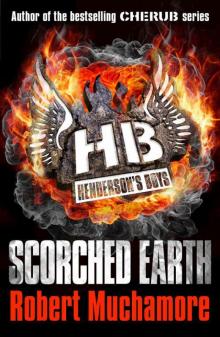 Henderson's Boys: Scorched Earth
Henderson's Boys: Scorched Earth The Fall
The Fall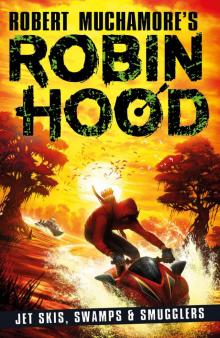 Jet Skis, Swamps & Smugglers
Jet Skis, Swamps & Smugglers Black Friday
Black Friday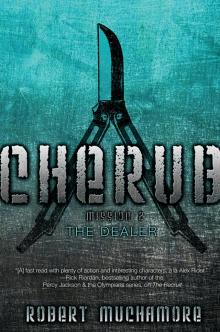 The Dealer
The Dealer CHERUB: Mad Dogs
CHERUB: Mad Dogs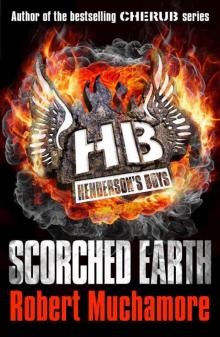 Scorched Earth
Scorched Earth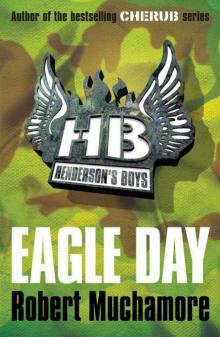 Henderson's Boys: Eagle Day
Henderson's Boys: Eagle Day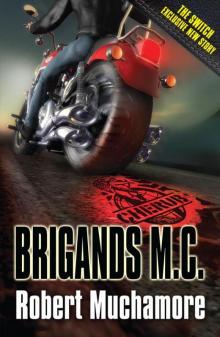 CHERUB: Brigands M.C.
CHERUB: Brigands M.C.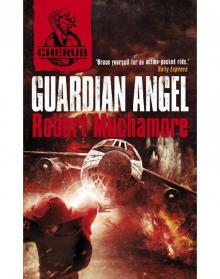 CHERUB: Guardian Angel
CHERUB: Guardian Angel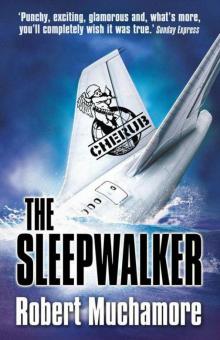 CHERUB: The Sleepwalker
CHERUB: The Sleepwalker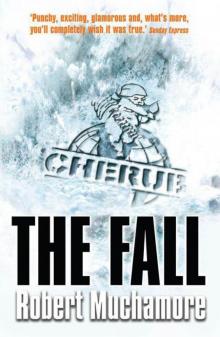 CHERUB: The Fall
CHERUB: The Fall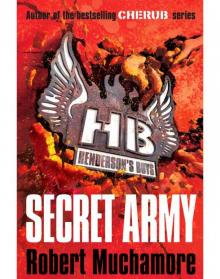 Henderson's Boys: Secret Army
Henderson's Boys: Secret Army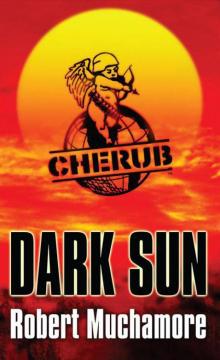 CHERUB: Dark Sun
CHERUB: Dark Sun CHERUB: Divine Madness
CHERUB: Divine Madness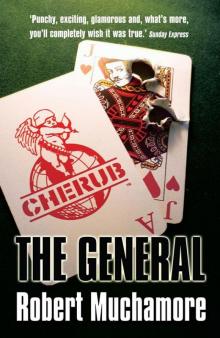 CHERUB: The General
CHERUB: The General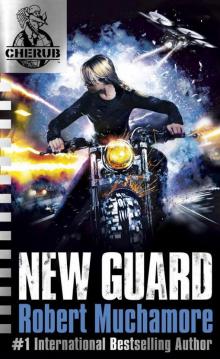 New Guard (CHERUB)
New Guard (CHERUB)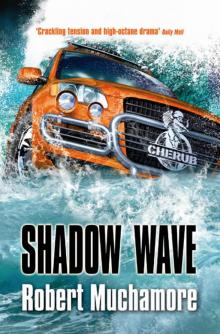 CHERUB: Shadow Wave
CHERUB: Shadow Wave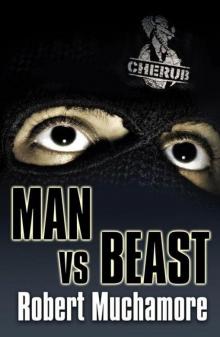 CHERUB: Man vs Beast
CHERUB: Man vs Beast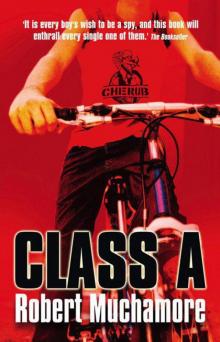 CHERUB: Class A
CHERUB: Class A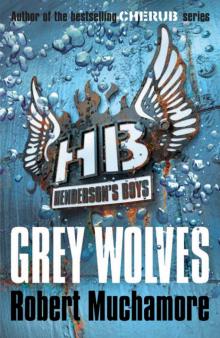 Henderson’s Boys 4: Grey Wolves
Henderson’s Boys 4: Grey Wolves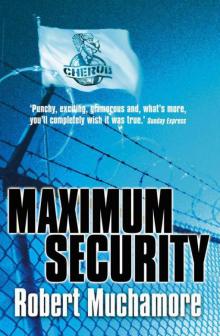 CHERUB: Maximum Security
CHERUB: Maximum Security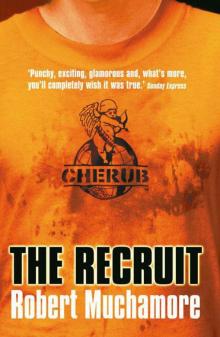 CHERUB: The Recruit
CHERUB: The Recruit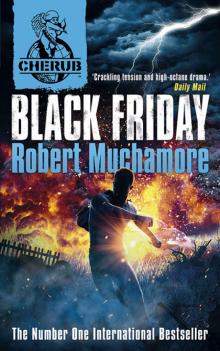 CHERUB: Black Friday
CHERUB: Black Friday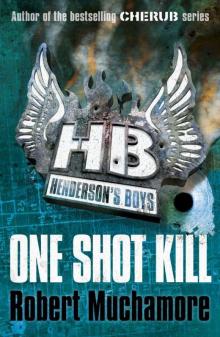 One Shot Kill
One Shot Kill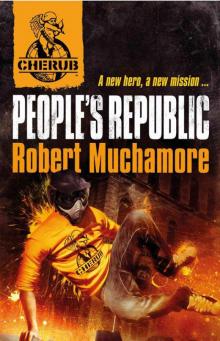 CHERUB: People's Republic
CHERUB: People's Republic